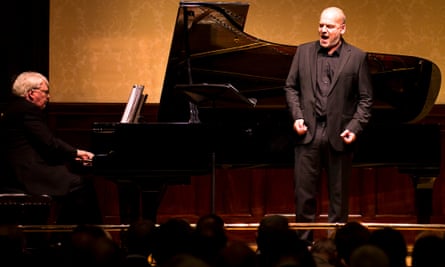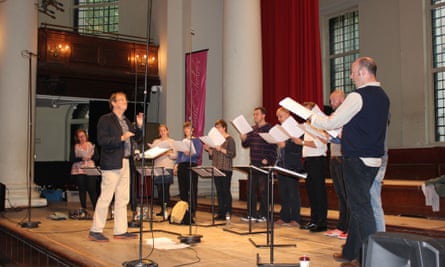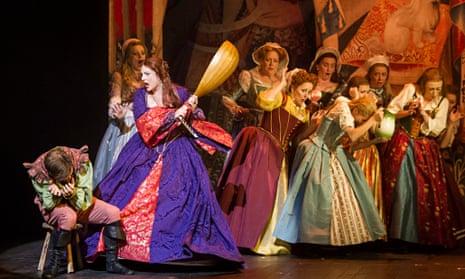Shrew-taming is not for the faint-hearted. The challenge of getting Shakespeare’s comedy to work for a modern audience is obvious (how do you get through it without raising the hackles of every woman in the house?), and Cole Porter’s 1948 hit musical Kiss Me, Kate, about an on-and-offstage Taming of the Shrew, is not plain sailing either (though misogynistic lyrics such as “in the dark they are all the same” and “I have oft stuck a pig before” get a retort in Kate’s number: “I hate men”).
If director Jo Davies has any doubts about the material, they do not show. This Opera North production loves, honours, obeys and sends up its material. Colin Richmond’s set borrows from the 16th-century tapestry of La Dame à la licorne and completes its homage with potted orange trees: the girl may not be cultivated but the garden is.
Jeni Bern’s Kate is more aggrieved diva than mouthy miscreant. The part, as Porter knew, requires operatic reach, although Bern’s splendid, disciplined voice inconveniently suggests she was tamed long ago. Quirijn de Lang’s nimble Petruchio, dressed from head to toe in saucy black leather, also sings with operatic poise, but when the two break into Wunderbar, they are so over-the-top that, at the end of the song, when they are supposed to make a transition to discover they are still in love, they do not convince at all – it’s a long jump too far.
The huge problem with this show is that the approach is unvaryingly tongue-in-cheek. This forfeits any chance to feel a thing. And Bella and Samuel Spewack’s book comes across as lame – what a pity Cole Porter wasn’t persuaded to write the whole musical (with help from Shakespeare). Not everything needs to go into the theatrical equivalent of inverted commas. Played straighter, the production would be funnier.
There are three moments where it takes off: Tiffany Graves’s lankily predatory Bianca sings Always True to You in My Fashion with pizazz; Wayne Robinson’s Paul sings Too Darn Hot with pugnacious cool (knowing when to hold back and when to let go – the very thing missing elsewhere); and Ashley Day’s Bill sings Bianca with a justifiably complacent smile, a suitable voice and wunderbar tap dancing – showing that there are times when it’s best to let your feet do the talking.
Over the next two years, Wigmore Hall plans a Schubert series: 40 concerts in which the composer’s complete songs will be performed. With the magnificent Austrian baritone Florian Boesch and Graham Johnson at the piano, playing with discretion and aplomb, we were off to a terrific start. In a purist spirit, the decision was taken that unfinished lieder would stay unfinished: where Schubert stopped, the musicians would too. The result, with Lebenstraum, was that one moment we were skipping along with a song living up to the line “Then, blithely dancing with zephyr-light steps”, then, not much later, there was an abrupt halt. It’s a measure of how finished the 12-year-old Schubert’s first song is that this inconclusiveness should have seemed such a joke.

Boesch is a masterly, relaxed, conversational interpreter who aims to act, within the limits of the concert hall, as well as sing. Performing Der Fischer on Wigmore Hall’s stage, he could not quite make the transition to a fisherman on a bank but had a handsome stab at it. Der Schiffer (The Boatman) was sung with attack, too, making one feel the music itself was waterproofed. Johnson revelled in its rollicking pace. For Totengräbers Heimweh (The Gravedigger’s Longing), Boesch almost conjured a spade as he sang. I especially enjoyed An Chloen, in which outbreaks of happiness from Johnson’s piano were answered by Boesch with a smile.
St John’s Smith Square is where the Tallis Scholars first performed in London, in 1976. They returned there last week for their 2000th concert. All have been conducted by their founder, Peter Phillips. Renaissance music doesn’t quite allow for a knees-up (Tallis’s exquisitely desolate Miserere was an encore), but for a godless listener, this sublime music is the closest one can get to holiness and I found myself tempted to see the Tallis Scholars as a musical religious order.

Phillips’s choir is perfectly balanced. Each voice is distinctly heard, none dominates. What strikes you most is the sense of single intention that makes for superb choral work. The Tallis Scholars’ first piece, Leroy Kyrie by Taverner, began with an easy swell – calm-inducing beauty. Sheppard’s Missa Cantate showed what one might describe as the charisma of melisma: one syllable extending through different notes. And Byrd’s Infelix ego set the words of a priest sentenced to be executed for heresy. The decorum was moving: a simple petitioning melody. And it was wonderful to hear the beautiful Ave Dei patris filia of Gabriel Jackson (born 1962). It accommodated itself effortlessly into the programme: questing music with bird-like delicacy.
Speaking of birds, it was also wonderful to glimpse Peter Phillip’s conducting: hands opening as if setting free a dove, or closing to punctuate with dotting-the-i’s exactitude. I found myself wishing I could get a choir’s-eye view to witness Phillips’ complete – lifelong – inhabiting of this music.
Star ratings (out of five)
Kiss Me, Kate ***
Florian Boesch and Graham Johnson ****
The Tallis Scholars ****

Comments (…)
Sign in or create your Guardian account to join the discussion